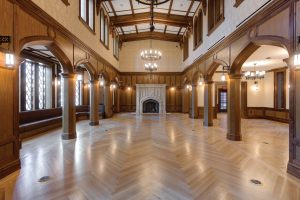Living and Learning at Vanderbilt University
It was Layton Construction’s version of the Big Bang—the implosion of one of Vanderbilt’s four Carmichael Towers in July 2019, an important milestone in the school’s Residential Colleges and West End Neighborhood Improvement project. Since then, Layton has made significant progress in moving these campus additions along as part of the company’s largest contract value solo project at the date of signing.
With the assistance of industry-leading technology, Layton was able to capture the exciting first step of the project as well as report frequently to the project teams and client on the project’s progress.
“We are utilizing so many great tools to construct the buildings, like BIM modeling,” says Layton senior project manager Sean Farrell. “We placed a BIM manager full-time on the project who also became a licensed drone pilot. He handles all of our drone updates to show progress of all work weekly.”
Guided by its Academic Strategic Plan and FutureVU Initiative, Vanderbilt University re-envisioned the West End Neighborhood to have three new residential colleges and a park-like setting in the West End Neighborhood. The Nicholas S. Zeppos College is the first of this trio and was completed in time for the 2020 academic year. As a part of this plan, the university decided to implode and mechanically demolish Carmichael Towers West, built in the 1960s, to make room for the structure of Residential College B, set to be completed in 2022.
The residential colleges create a unique, on-campus student residence that integrates students’ academic experience into their residential lives and creates communities and opportunities for learning outside the classroom among a diverse student body.

LIVING PRETTY, INSIDE AND OUT
The preconstruction and construction project involves three residential colleges that will house more than 1,300 beds. The residential colleges will all include multi-use spaces, lounges, game rooms, and collaborative spaces, while the design includes an ornate, Gothic interior and exterior style to reflect Vanderbilt University’s 150-year-old aesthetic. Additionally, the residential colleges will include kitchen and dining areas, common space, and a courtyard. The structures will largely be made of concrete—Layton’s specialty. Spanning over half a million square feet, the students are sure to live comfortably in the beautiful student residential colleges.
In addition to the residential colleges, the university used the opportunity to launch a beautification effort for the neighborhood. Performing various upgrades, Layton reconstructed 500,000sf of outdoor community space, including the former Kensington Place and 24th Avenue South, from a concrete jungle into pedestrian and bicycle-friendly pathways as well as green spaces. The project also included infrastructure upgrades such as stormwater, sanitary, electrical, and hot water utilities throughout the neighborhood.
THE LOCAL IMPACT
All three residential colleges were designed to achieve LEED certification and will include chilled and hot water lines feeding into the various neighborhood buildings via underground piping connected to the university’s main energy plant, cooling towers, and boilers. The piped chilled and hot water that feeds the buildings were installed during the neighborhood’s development upgrade, which took place in unison with Nicholas S. Zeppos College. The upgrade supports Vanderbilt University’s sustainability goal to reduce its energy consumption and become carbon neutral by 2030. The three new residential colleges are examples of how the university is keeping sustainability in mind from start to finish in all their capital projects.
Layton strives to employ local subcontractors when building for clients to support local economies, and this project is no exception. Layton is taking advantage of the Nashville market in conjunction with national teams, all while working within the client’s budget to provide a target value design approach to construction.
“Our Layton team is incredible,” said Farrell on working with the numerous local and cross-national manufacturers and subcontractors that were key to the project. “They all witnessed Layton’s sincere approach to their success as it relates to our success. We considered this a key management approach and it has served us well and looks to continue to serve the project needs to completion.”
Residential College B is currently under construction and is expected to be completed in July 2022. In August 2021, the last two existing Carmichael Towers are tentatively scheduled to be imploded, which will launch Residential College C into construction in early 2022. Though the team faces challenges for the project, including the large amount of masonry detail and roof structure, the project is still on schedule to be completed by 2024.
